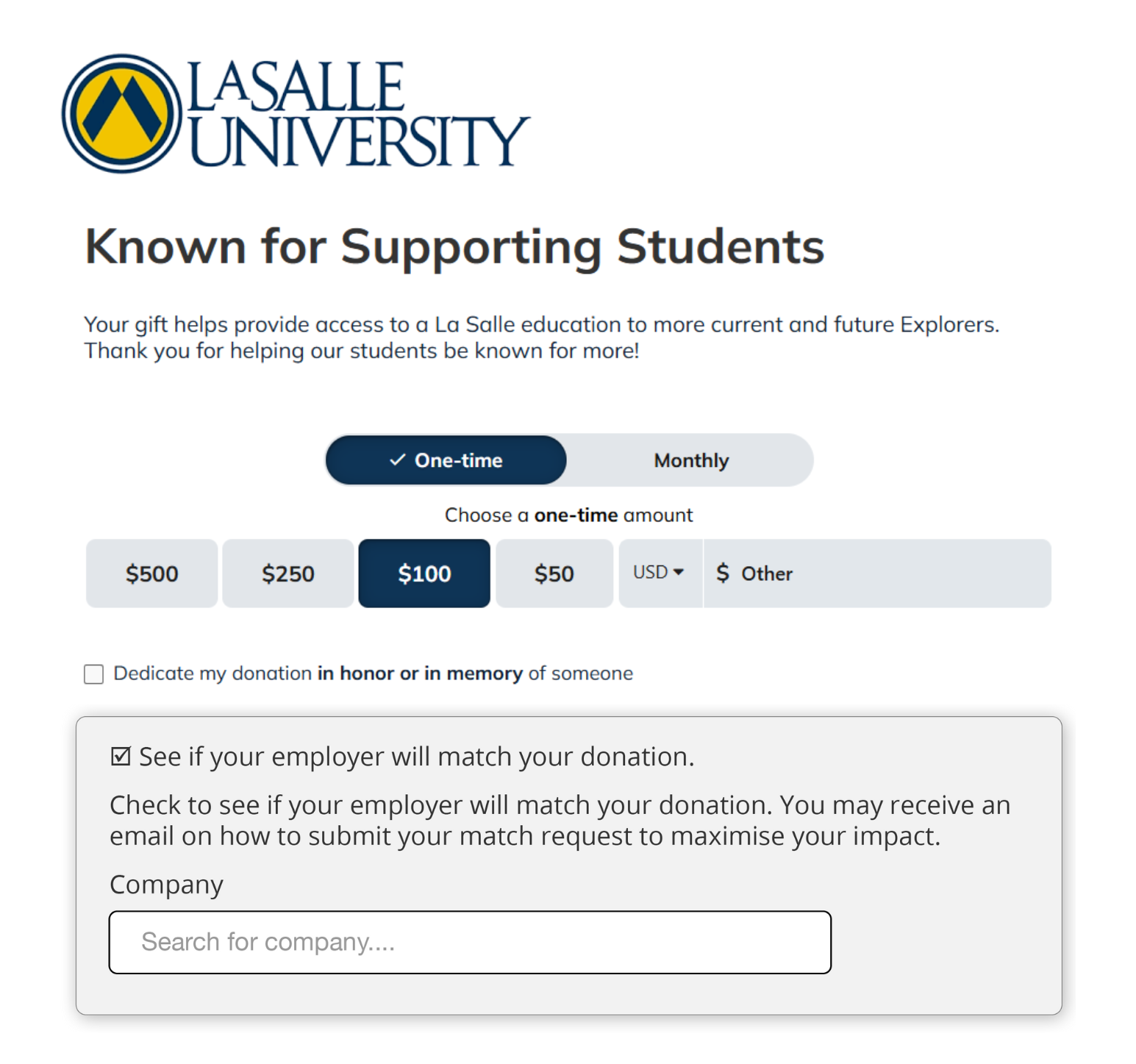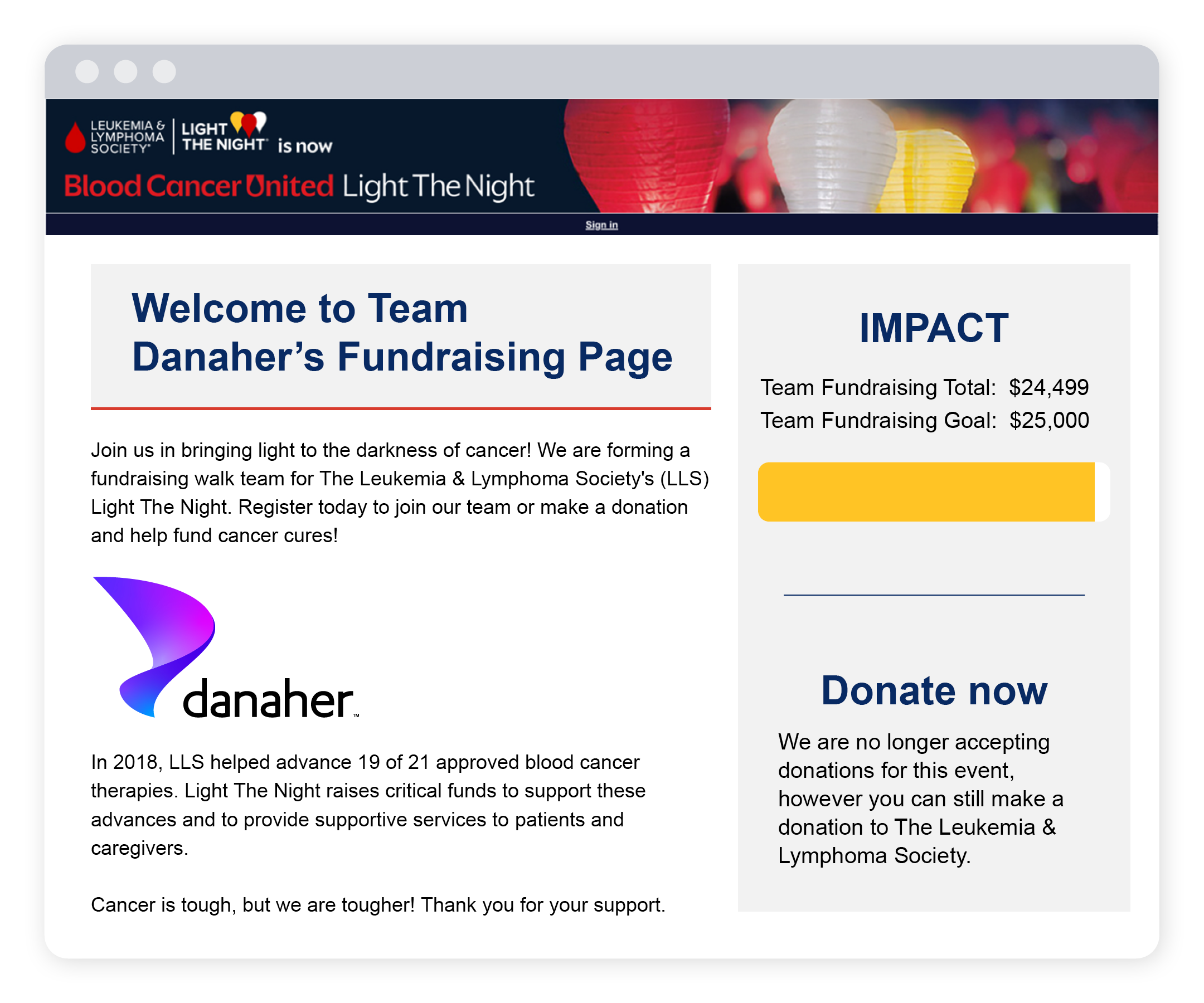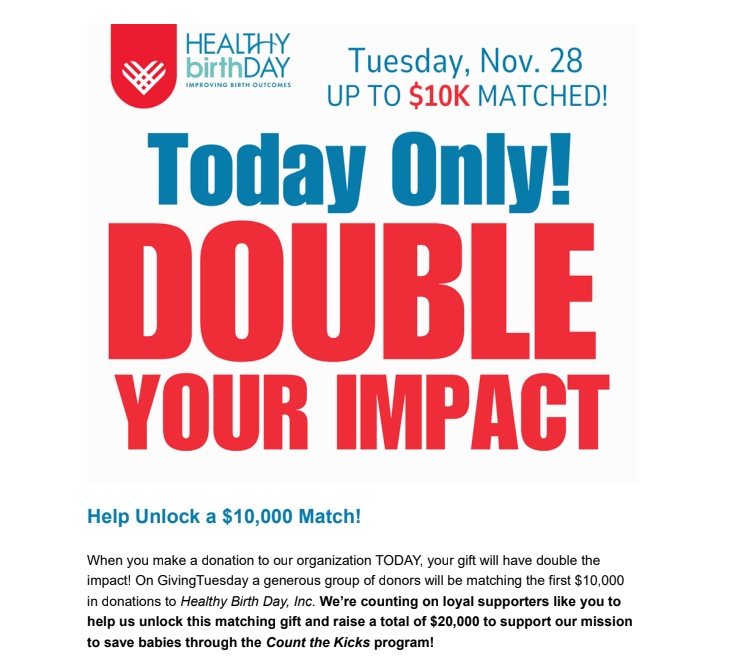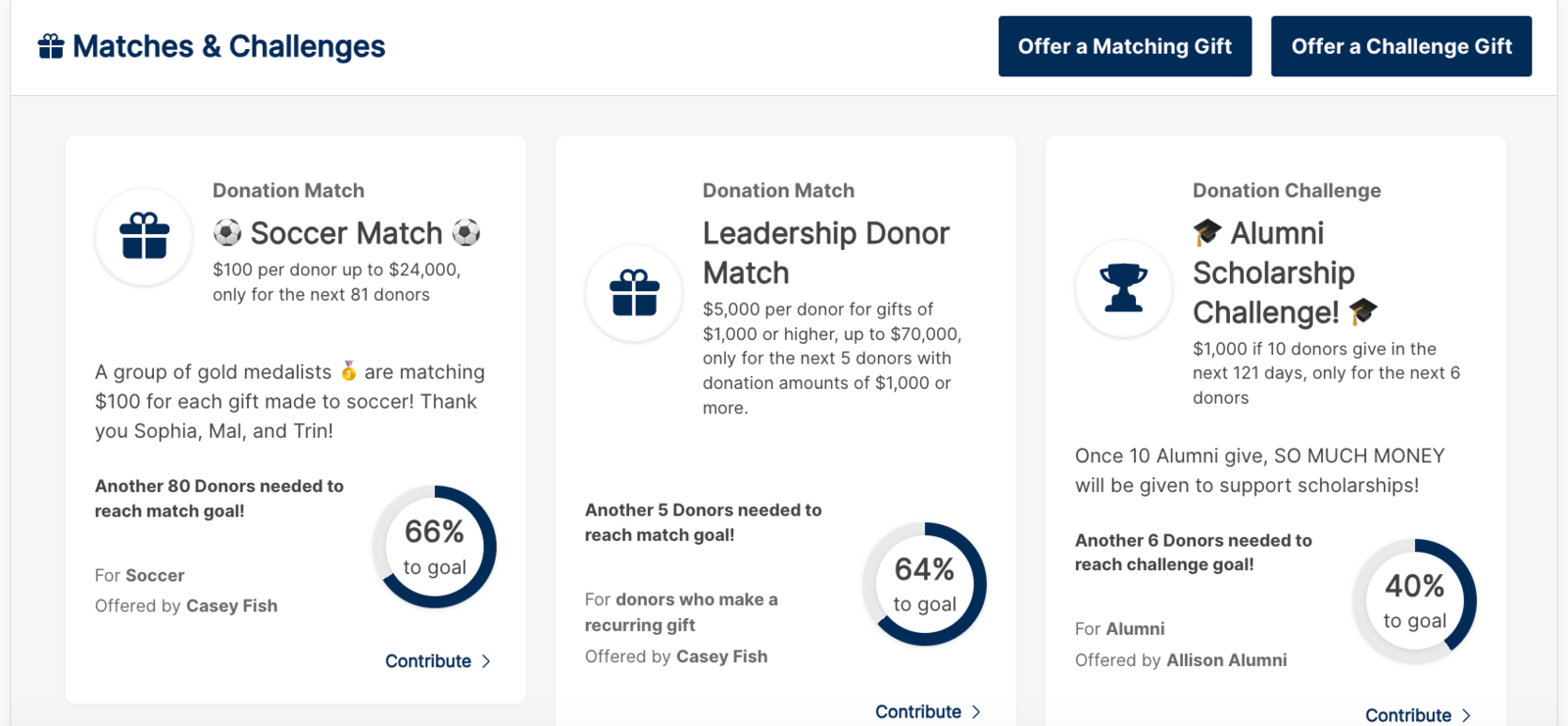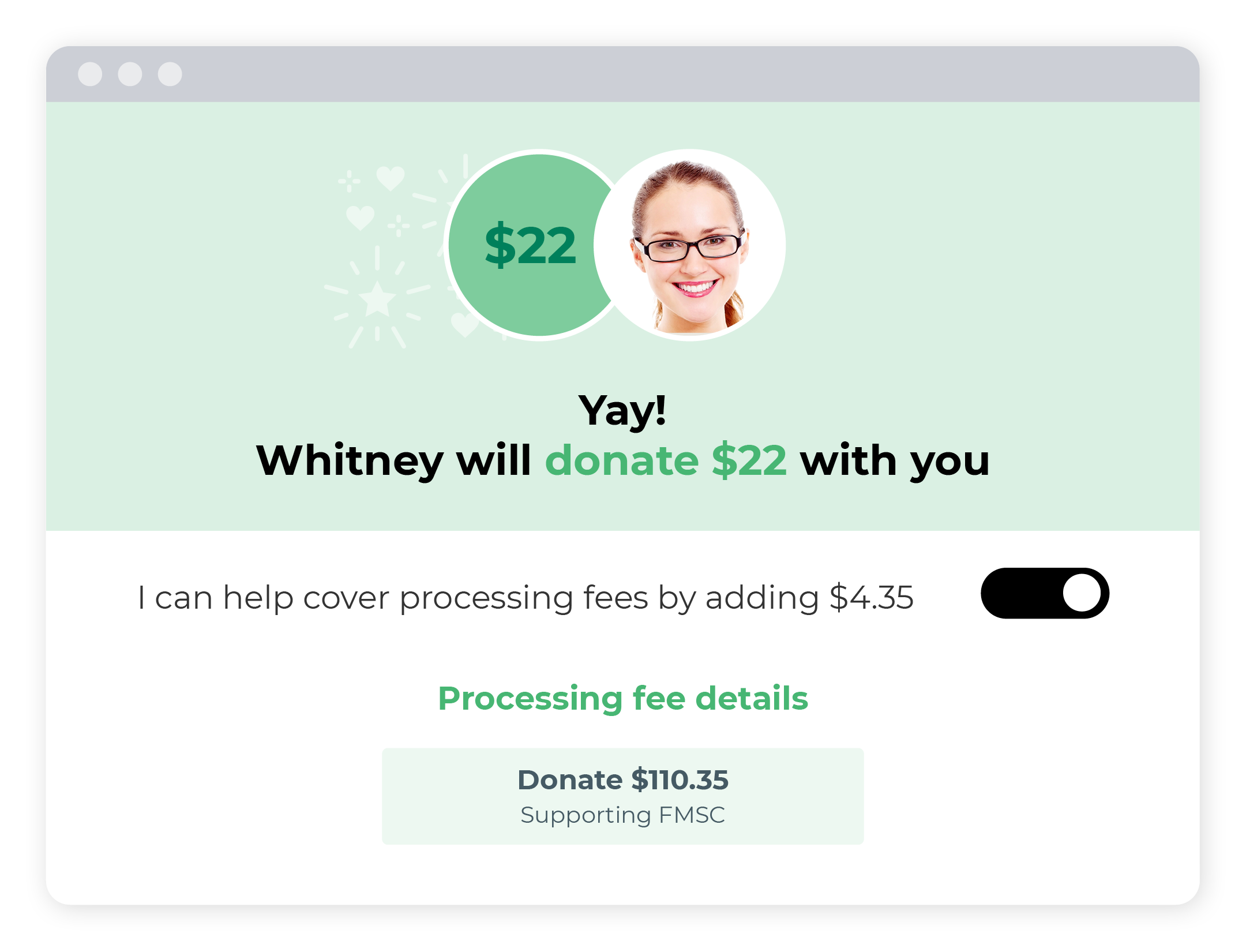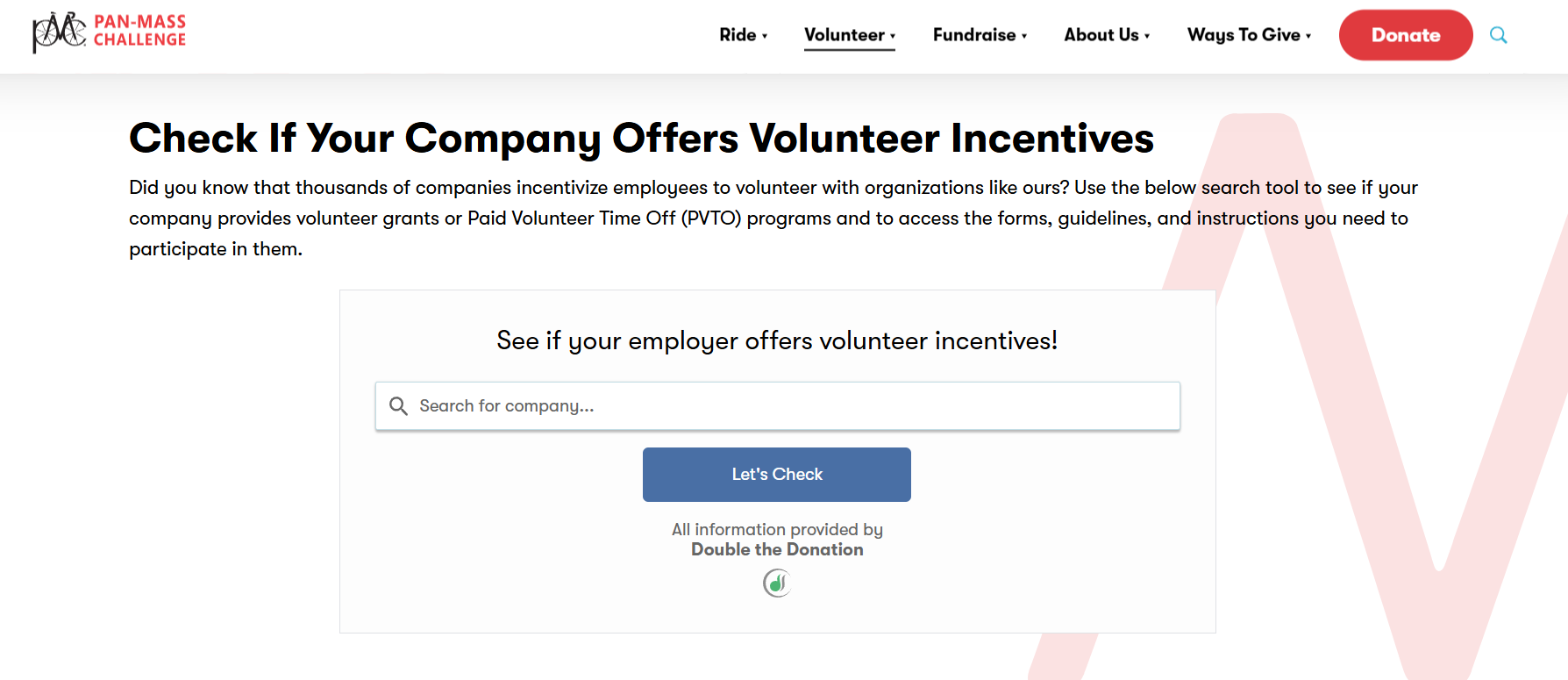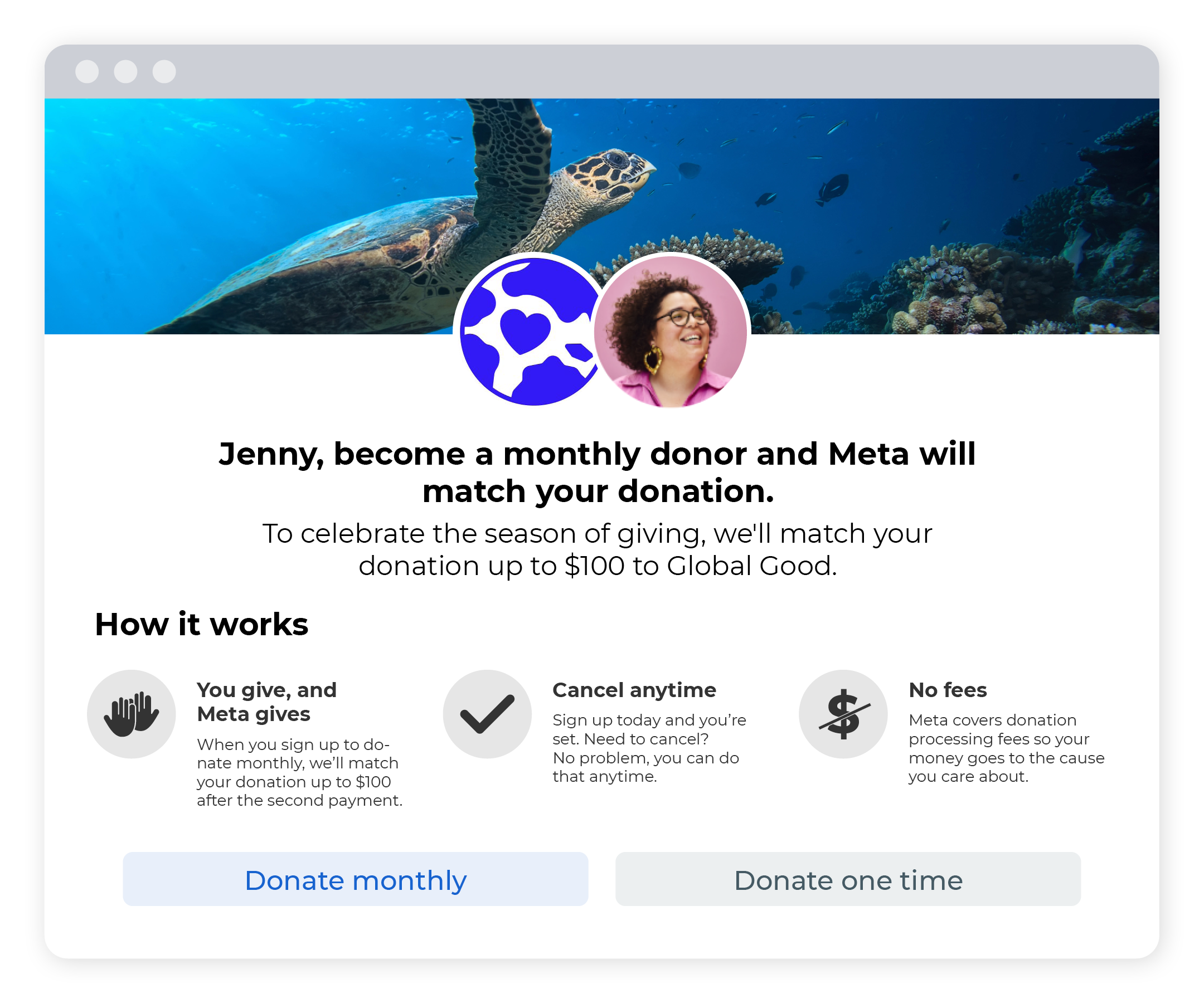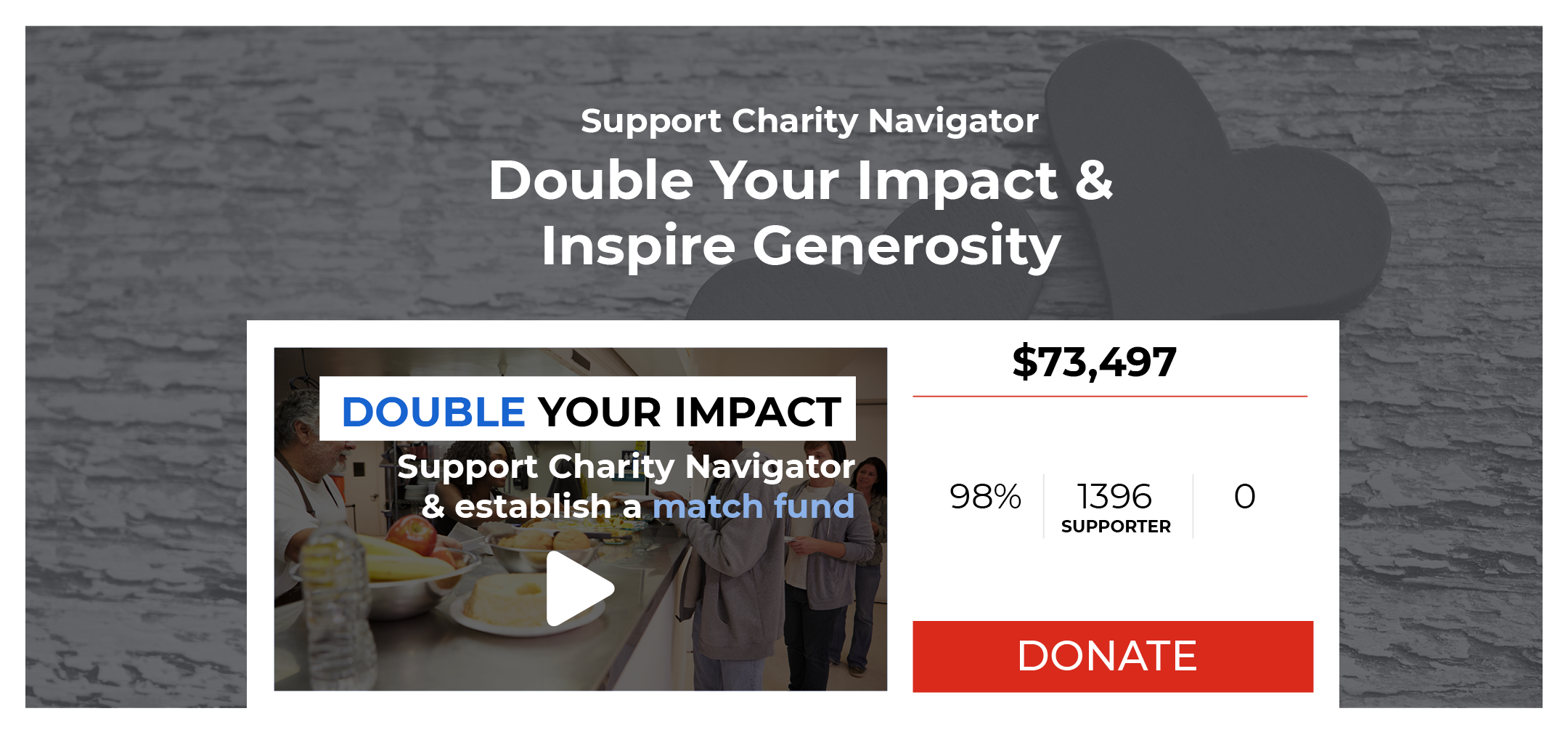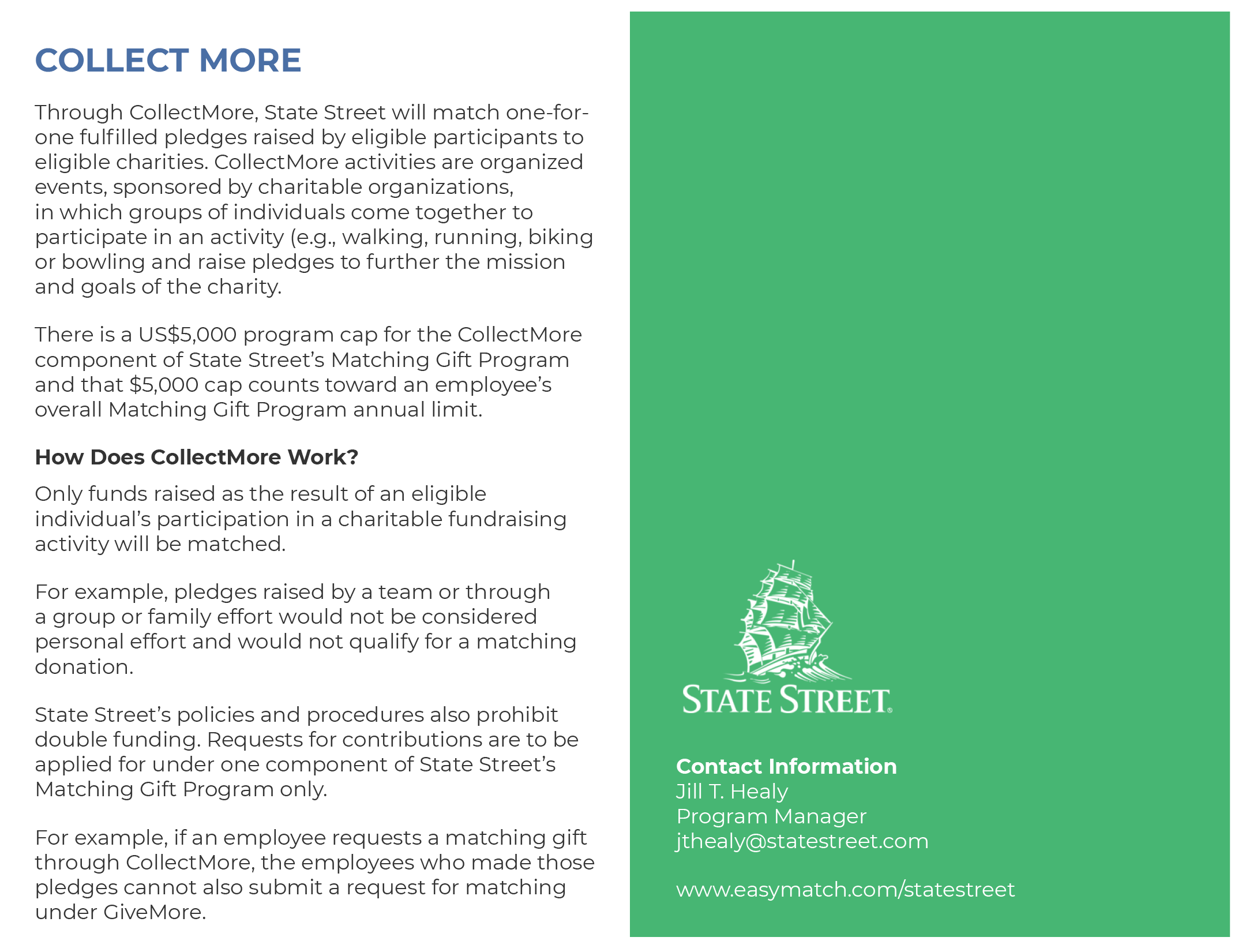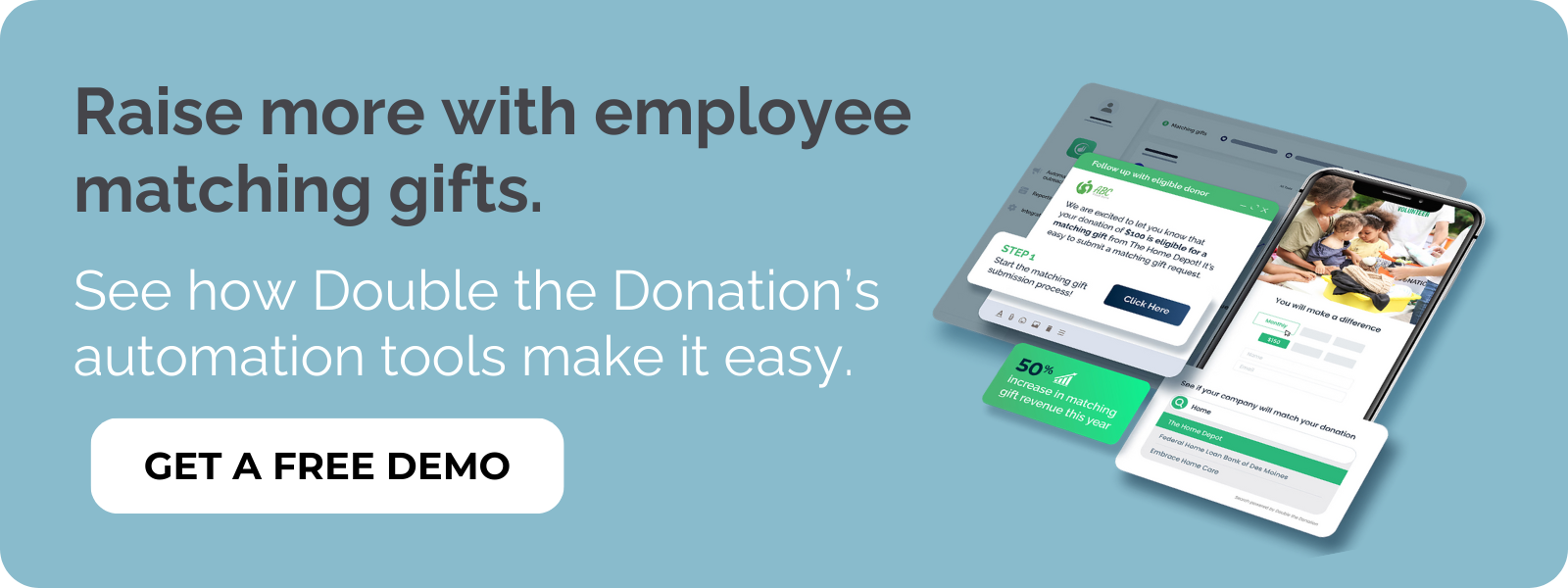Fundraising is an essential part of any nonprofit organization’s efforts to meet its mission, but securing donations isn’t always straightforward. While traditional donation campaigns remain effective, one of the most powerful ways to maximize revenue is through fundraising matches.
There are many types of fundraising matches, each with its own unique benefits. Whether you’re considering employer-matched gifts, peer-to-peer campaigns, or social media challenges, each type offers your nonprofit a way to reach new donors and encourage existing supporters to give more.
In this post, we’ll explore the types of fundraising matches that your organization should consider to boost your donation efforts and achieve your fundraising goals. Let’s get started with the basics.
What is a fundraising match?
A fundraising match is a dedicated program wherein a major donor, company, or other entity agrees to match donations made by others, typically on a one-to-one basis or at a set ratio. This matching process essentially doubles the donation impact, encouraging supporters to contribute more, knowing their gift will be matched by another party.
Fundraising matches can take many forms, but they all share one common goal: increasing the total funds raised by a nonprofit and maximizing the impact of each donor’s contribution.
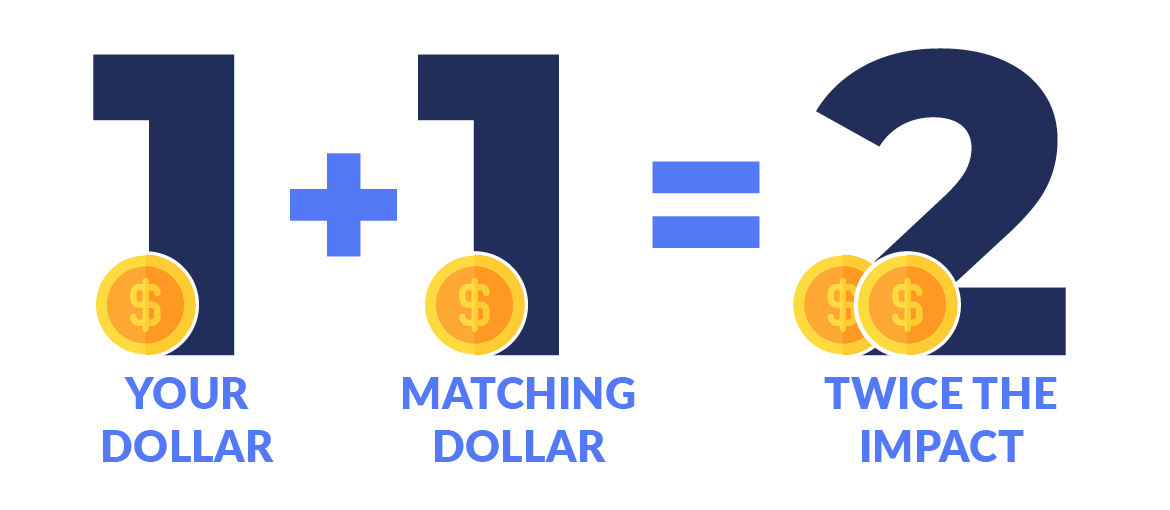
The key idea behind a fundraising match is to amplify donations by involving an external matching entity. Often, this involves companies matching donations made by their employees or major donors pledging to match contributions raised during specific campaigns or events. This strategy can help nonprofits raise more funds while also engaging their donor base more effectively.
How It Works:
When a donor contributes to a fundraising campaign that offers a match, they’re essentially “doubling” their gift through the matching entity’s contribution. For instance, if a donor gives $50, and their company offers a 1:1 match, an additional $50 will be donated, bringing the total contribution to $100.
This creates a win-win situation: the nonprofit receives more funds, the donor feels their contribution has more impact, and the company or other matching entity can highlight their commitment to social responsibility or community engagement.
Why It’s Beneficial for Nonprofits:
Fundraising matches serve as an excellent way to stretch limited fundraising dollars. For organizations with tight budgets, offering a matching gift can create a sense of urgency and excitement, driving more donations within a set period. Additionally, matches can be used as a marketing tool to rally support for specific campaigns, making it easier to hit or exceed fundraising goals.
Fundraising matches are an ideal way to engage both new and existing donors. They can also be used in various contexts, from corporate-sponsored matches to peer-to-peer challenges, making them a versatile strategy to incorporate into your fundraising efforts.
What are some types of fundraising matches to consider?
When it comes to maximizing the impact of your fundraising efforts, leveraging different types of fundraising matches can make a significant difference. These matches not only help increase the total funds raised but also encourage greater donor engagement and participation.
Whether you’re looking to motivate your existing supporters to give more or attract new donors to your cause, understanding the various types of matches available can help you choose the best approach for your organization’s goals.
Employer matching gift programs
Employer or corporate matching gift programs are some of the most popular and effective fundraising match types available. In these programs, a company agrees to match its employees’ donations to qualified nonprofits. Typically, employers match gifts on a 1:1 ratio, though some companies offer higher or lower matching amounts.
These programs are typically easy to promote and can lead to a significant increase in the total donations raised during a campaign.
Recommended use cases:
Employer matching gift programs are especially valuable for nonprofits with a strong base of corporate supporters or for individuals who work for companies that offer them. They can be used year-round, but are especially impactful during key fundraising periods, such as year-end campaigns or giving days.
These matches encourage employees to give more, knowing their contributions will be doubled, and can also be a great way to secure ongoing funding from corporate partners.
Here’s an example of an employee matching gift promotion by LaSalle University:
Platforms available:
Several platforms provide tools to help nonprofits manage and track employer matching gifts:
- Double the Donation Matching: This #1-rated platform integrates with your nonprofit’s donation system, automating the identification of matching opportunities and encouraging donors to submit their gifts for matching.
- HEPdata: Another platform that provides tools for managing employer matching programs, helping nonprofits track donations and secure matching funds efficiently.
Employer matching programs not only amplify individual supporters’ donations but also strengthen the relationship between nonprofits and corporate sponsors. By equipping fundraisers with these platforms, nonprofits can streamline the process and ensure that every eligible donation is matched.
One-off employer matching gifts
One-off employer matching gifts are targeted matching donations, often set up for specific campaigns or time-sensitive events. Unlike traditional employer-matching gift programs that are generally ongoing in nature, one-off matches are typically used during special fundraising efforts, in which a company agrees to match employee donations made during a specific period or event.
This type of match can spur urgency and excitement, as individuals know their contributions will be amplified for a limited time.
Recommended use cases:
One-off employer-matching gifts work well for time-bound fundraising campaigns, such as end-of-year drives, special events, or emergency appeals. When donors know their contributions will be matched for a limited time, it often creates a sense of urgency that encourages them to give more. Additionally, these matches can be used for unique causes, such as disaster relief or capital campaigns, where you want to generate maximum support in a short window.
Here’s an example of a one-off employer matching gift campaign by Blood Cancer United (formerly LLS):
Platforms available:
- Double the Donation Matching: This platform allows nonprofits to integrate one-off employer matches into their customizable database solution, encouraging donors to take action with tailored next steps throughout a set time limit. One-off matches are typically promoted by companies or nonprofit organizations via email or social media, highlighting their time-sensitive nature to create a sense of urgency and maximize donations.
This type of matching is highly effective at generating quick bursts of fundraising activity, especially when strategically promoted to qualifying employees.
Major donor challenge matches
Major donor challenge matches involve a key donor (or group of donors) who pledges to match all donations up to a certain amount. These challenge matches are often used to incentivize other donors to contribute by showing that their gifts will be doubled (or even tripled) by the major giver.
These campaigns are often time-sensitive and can be highly effective in generating excitement around a specific cause or fundraising goal.
Recommended use cases:
Major donor challenge matches are most effective for raising large sums of money quickly. These types of matches are commonly used for annual fundraisers, capital campaigns, or year-end giving efforts. They work best when you have a committed donor willing to offer a substantial match and when the nonprofit has an established donor base motivated by the prospect of their donation being amplified.
Here’s an example of a major donor challenge match from Healthy Birth Day:
Platforms available:
- MatchNice: MatchNice provides tools specifically for creating and managing major donor challenges. The platform allows nonprofits to set up matching campaigns in which large donors or corporate sponsors publicly pledge to match donations, driving momentum and excitement for the campaign.
Major donor challenge matches can have a significant impact, especially when paired with a strong marketing strategy and communication plan to rally donors.
Flexible matching campaigns
Flexible matching campaigns allow donors to engage in highly customizable giving programs, creating an environment where they can help drive fundraising in ways that fit their preferences. These campaigns generally offer two types of matching tools: matches and challenges. Matches incentivize donors to contribute incrementally by committing a set amount per donation, while challenges motivate donors to meet specific thresholds, such as a certain number of donations or a fundraising target. Both options provide a way to motivate others and boost campaign momentum, with the added flexibility to tailor terms to specific donor preferences or campaign goals.
Recommended use cases:
Flexible matching campaigns are ideal when you want to inspire donor engagement and increase both the number of donors and the total funds raised. These campaigns work well for special events, capital campaigns, or any fundraising initiative that requires motivating a large group of supporters to take action.
These campaigns are especially powerful for end-of-year fundraising, community-based campaigns, or launching new initiatives that require building momentum quickly.
Here’s an example of a flexible matching campaign by GiveCampus:
Platforms available:
- GiveCampus: Fundraising solutions like GiveCampus offer both matching and challenge campaigns, allowing nonprofits to set up flexible, custom parameters. Organizations can choose to match a set dollar amount per donation, a certain number of donors, or a specific fundraising goal.
To maximize the effectiveness of flexible matching campaigns, set clear goals and communicate these to your donors. The prospect of unlocking a match or challenge often motivates donors to give more and encourages their peers to do the same.
Donor-to-volunteer matches
Donor-to-volunteer matches provide a unique way to amplify the impact of volunteer time by converting hours spent volunteering into financial contributions. These programs encourage individuals not only to donate their time but also to make a financial contribution to the nonprofit they’re supporting. When someone volunteers, their time unlocks a donation match from a fellow donor or community member, significantly increasing the total support for the cause.
This type of match is designed to maximize both volunteer engagement and financial support, creating a deeper connection between volunteers and the organizations they serve.
Recommended use cases:
Donor-to-volunteer matches work best for nonprofits with a dedicated base of volunteers who regularly contribute their time. These matches are ideal for programs focused on building long-term relationships with volunteers and fostering a sense of community and collective impact. They’re especially useful for campaigns that rely on active volunteer engagement, such as those running volunteer-driven events or ongoing community outreach programs.
Here’s an example of a donor-to-volunteer match from Kindly:
Platforms available:
- Kindly: Kindly connects volunteers with donation matches through its platform. When volunteers log their hours, they unlock the ability to make a donation, which is then matched by a like-minded community donor. This system helps nonprofits drive additional funding by converting volunteer time into financial contributions, maximizing the impact of both volunteerism and charitable giving.
By leveraging donor-to-volunteer matches, nonprofits can foster a deeper connection with their supporters while encouraging more frequent donations and volunteer participation. It’s a win-win for organizations looking to create sustained support and increase their financial and human resources.
Volunteer hour-matching
Volunteer hour-matching programs, also known as corporate volunteer grants, involve companies donating money based on the number of hours their employees volunteer for a nonprofit. These programs are designed to encourage volunteerism by turning an employee’s time spent helping into a financial donation to the nonprofit. For example, a company might donate $20 for every hour an employee serves at a nonprofit, providing a grant of $160 or more for a full day’s volunteer work.
Recommended use cases:
Volunteer hour-matching is particularly effective for organizations with a dedicated volunteer workforce. It’s ideal for large nonprofits or those focused on community-based initiatives that rely heavily on volunteers. Nonprofits can encourage volunteers to log their hours with their employers to secure matching donations, thereby increasing both engagement and funding.
Here’s an example of a volunteer grant promotion by the Pan-Mass Challenge:
Platforms available:
- Double the Donation Volunteering: Double the Donation’s platform helps nonprofits track volunteer hours and ensure they’re eligible for volunteer hour matches or even other workplace giving programs. This integration simplifies the process for volunteers and organizations, making it easier to maximize donations from volunteer hours.
These volunteer-based programs offer an excellent opportunity to raise additional funds while also fostering long-term relationships with supporters and corporate partners alike.
Social matching
Social matching involves matching donations made through social media platforms, often during fundraising campaigns that are promoted on platforms like Facebook. Corporate sponsors or large donors pledge to match contributions made by individuals who give via social media channels. This type of match leverages the power of social sharing to amplify donations while creating viral fundraising campaigns.
Recommended use cases:
Social matching is ideal for nonprofit campaigns that have a strong social media presence. Whether it’s a holiday campaign, a disaster relief drive, or an awareness-raising initiative, social matching can increase visibility and drive donations. This is especially effective when nonprofit supporters share their donation stories on social media, encouraging their networks to contribute as well.
Here’s an example of a social match campaign from Meta, Facebook’s parent company:
Platforms available:
- Facebook Fundraising Challenges: Facebook allows nonprofits to create donation campaigns that can be boosted by social sharing and corporate matches. Corporate sponsors (including Meta itself) often match donations made through Facebook Fundraising campaigns, enhancing the reach of these efforts.
Social matching leverages peer influence, making it a highly effective tool for nonprofits looking to expand their donor base and reach new supporters.
Crowdfunded matches
Crowdfunded matches represent a strategic fundraising approach where an organization raises funds from multiple smaller or mid-level donors, creating a “match pool” that can then be used to match future donations in an upcoming campaign.
This process involves gathering contributions from a collective group of donors to form a pool of matching funds, which are then used to encourage new donations during a specific fundraising drive or event.
Recommended use cases:
Crowdfunded matching is ideal for nonprofits looking to build a strong sense of community and collaboration among their donor base. It works particularly well for smaller or mid-sized organizations that may not have access to large corporate sponsors but still want to harness the power of matching gifts to boost their fundraising.
This strategy is also effective when you want to engage your donor community and encourage them to take an active role in the fundraising process, as it relies on the collective effort of many individuals.
Here’s an example of a crowdfunded match campaign from Charity Navigator:
Platforms available:
- GoFundMe: GoFundMe allows nonprofits to create crowdfunding campaigns in which individual donations can be pooled to create a matching fund. The platform provides tools for setting up the crowdfunded match and allows organizations to manage their donor lists and match progress.
Crowdfunded matching campaigns offer a unique opportunity for nonprofits to leverage their community’s collective support, creating a compelling reason for new donors to give and increasing total funds raised during a campaign. By using a match pool built from smaller or mid-level donations, nonprofits of all shapes and sizes can amplify their fundraising efforts and inspire broader donor participation.
Run/walk/ride fundraising matches
Run/Walk/Ride fundraising matches are tailored for athletic events where participants fundraise by participating in experiences such as marathons, 5Ks, or charity bike rides. Within this type of fundraising match, the event participant’s employer agrees to match the total funds raised by the participant during these events, typically through a peer-to-peer fundraising platform.
Recommended use cases:
These types of matches are perfect for athletic events or community runs/walks that raise money for charity. They work well when you have a large number of participants, as you’re likely to locate some that work for companies with these fundraising match programs in place. With a corporate sponsor willing to match the total funds raised, you can amplify the contributions and increase overall fundraising.
Here’s an example of a peer-to-peer fundraising match program policy from State Street Corporation:
Platforms available:
- Double the Donation Matching: This platform allows organizations to incorporate matching gifts into athletic fundraising events, offering participants the chance to have their contributions matched by corporate sponsors.
Run/Walk/Ride matches offer a fun and engaging way to bring in donations, while the matching aspect encourages participants to reach higher fundraising goals.
Frequently Asked Questions (FAQ)
1. What are the main types of fundraising matches?
The main types of fundraising matches include employer matching gifts, major donor challenge matches, and one-off employer match campaigns. Each type encourages donors to give more by doubling or tripling the impact of their contributions, helping nonprofits reach goals faster.
2. What types of fundraising match structures can nonprofits use?
Common match structures include 1:1 matches, 2:1 matches, dollar-for-dollar matches, challenge matches, and capped match pools. Each format creates urgency by showing donors exactly how their contributions will be amplified. Nonprofits choose structures based on donor capacity, campaign goals, and the level of excitement they aim to generate.
3. What is a major donor challenge match?
A major donor challenge match is a fundraising strategy in which a high-capacity donor pledges to match other contributions up to a specific amount or within a set timeframe. This approach motivates donors to act quickly, fosters excitement, and drives higher participation rates.
4. Which nonprofits have successfully used fundraising matches to grow revenue?
Leading nonprofits such as American Red Cross, The Nature Conservancy, and United Way of Central Florida have effectively leveraged fundraising matches. By partnering with corporate sponsors and creating limited-time matching opportunities, they’ve driven major increases in donor engagement and giving totals.
5. How can small and mid-sized nonprofits use fundraising matches effectively?
Smaller organizations can maximize impact by clearly promoting match opportunities across donation pages, social media, and email campaigns. Highlighting the urgency of matching challenges and using storytelling to show impact can help attract both corporate partners and individual donors.
Wrapping Up & Next Steps
There are many types of fundraising matches that nonprofits and schools can leverage to boost their campaigns and increase donations. Whether through employer matching, peer-to-peer challenges, or social media initiatives, each type offers unique benefits and can help your organization reach more donors.
Understanding and strategically deploying different types of fundraising matches available can significantly enhance your revenue-generation efforts. To maximize the potential of these opportunities, it’s important to use the right tools to manage and track their success. Good luck!
Interested in learning more about fundraising matches and how you can make the most of them? Check out these additional recommended resources:
- Free Download: The Ultimate Guide to Corporate Matching Gifts. Corporate matching gifts are one of the most popular forms of fundraising matches. Here’s what you should know about them with this complete guide!
- Matching Donation Challenges: How to Double Donors’ Impact. Looking to grow your knowledge on all things matching donation challenges? Explore top tips and tricks in this helpful resource.
- Key Statistics on Challenge Grants and Donation Matches. Dive into challenge grants and donation matches with an overview of recent statistics and trends! Discover what you need to know about them here.

